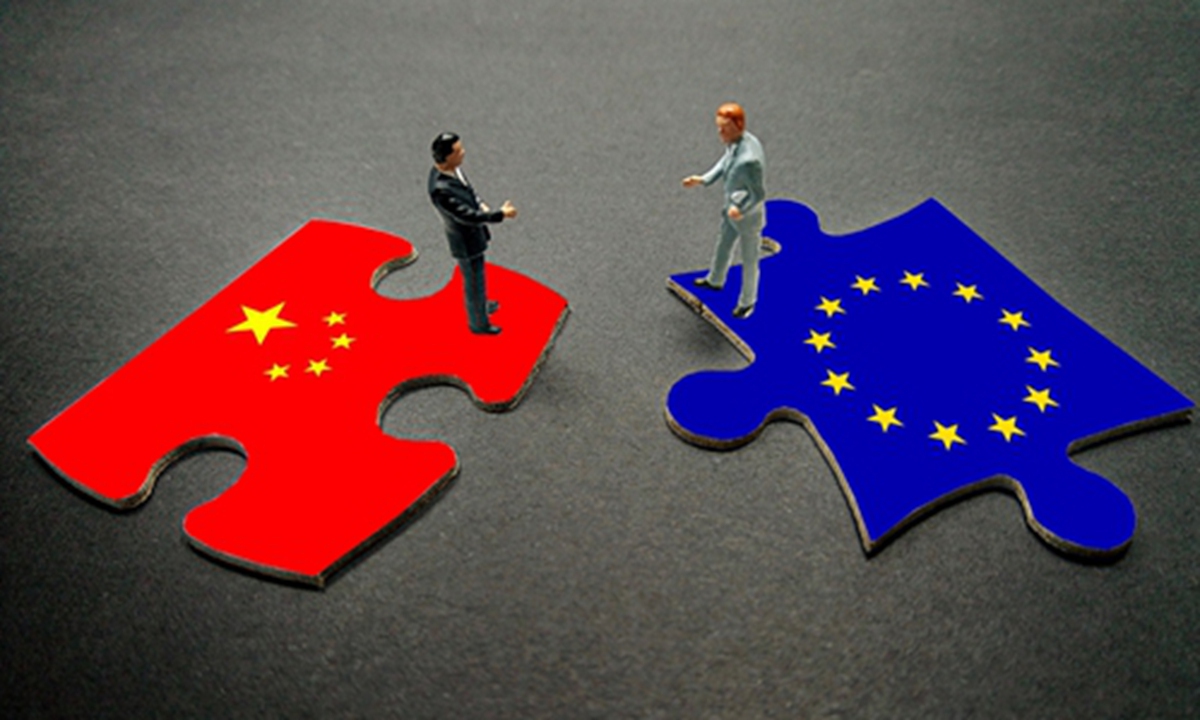
China-EU relationship Photo: VCG
It's amazing how NATO and the EU can watch the crisis in Ukraine and not reflect on issues like these: 1) Prioritising weapons over all other security tools creates neither security nor sustainable peace; it creates hubris, anti-intellectualism and militarism. 2) Alliances can only thrive if they appoint enemies. 3) Military deterrence doesn't work but stimulates escalation. With confrontational policies and offensive weapons, there can never be common security, stability or peace. 4) Applying one set of rules for "us" - e.g. the international rules-based order in contravention of UN-based international law - and another for "them" is moral fraud. 5) Creating hard borders with polarisation is unwise. Lacking empathy and a sense of history makes for counterproductive, self-destructive decisions. 6) Peace is about analysing the conflicts - or problems - that always stand between the parties. War happens when conflicts are neglected.
Since 1949, NATO has promised its taxpayers that they would live in peace. But today's Europe is closer to catastrophe than ever before.
The world-domineering Western paradigm of security politics has come to its end. But more dollars and weapons are pumped into it.
By and large, the EU sides with and submits to US policies because, as a Union, it has failed to develop an independent comprehensive one-voice foreign and security policy.
Immediately after the Russian military intervention in Ukraine, it resorted to tit-for-tat devoid of analyses of the longer-term consequences to basically cut off - cancel - everything Russian. This is blind punishment and hate mood as if Russia would not exist in the future.
Next, it argued that China should put pressure on Russia and "help" the West to stop that war and that China should face negative consequences if it doesn't.
Whether this is a genuine plea for help or another way of promoting the Western Cold War agenda vis-a-vis China remains to be seen. This attitude will prevent progress at the upcoming China-EU summit.
The West's sanctions on Russia are extraordinarily ill-considered and will have self-destructive consequences. For a while, they will surely hurt the Russian innocent people, but they will, beyond a doubt, boomerang back on the West, with a deep socio-economic crisis following.
Russia will see no reason to work with the West in the future - and will orient itself toward countries including Iran, India, and China. Contrary to the increasingly unreal and autistic perceptions of the West, the whole world does not support its reactions to Russia's military operation in Ukraine.
The European Union has displayed a politically and rhetorically anti-China stand - on issues related to China's Xinjiang, Hongkong, Taiwan, as well as provacation of Lithuania - but is now asking China to "help" solve a problem which several Union members have contributed vitally to as NATO members.
NATO's confrontational expansion was always unwise. NATO should have been closed down when the Warsaw Pact and the Soviet Union dissolved.
History is catching up. The EU has failed miserably in living up to its own Lisbon Treaty and failed to work for peace inside the Union and the world.
If the EU/NATO members had distanced themselves from the US-promoted coup in Kiev in 2014 and insisted on other security arrangements for Ukraine's future instead of full NATO membership, the world would not be in this dangerous situation.
The US and NATO want to tie up Russia's militarily for as long as possible and undermine its economy and society, then turn to what it foolishly believes is its No.1 adversary: China.
Russia, of course, has other options and should negotiate a ceasefire and a new future relationship with Ukraine. The EU will have to become more independent to contribute constructively to the emerging multi-polar world order.
Europe desperately needs an entirely new all-European security and peace system, a kind of European UN, based on common security with Russia, trans-armament toward defensive military structures, non-threatening postures, early warning and - above all - civilian, civilised negotiations, instead of defunct and militarist escalatory deterrence.
In this sense, the NATO-Russia conflict in Ukraine could be used as a constructive turning point. It should mark the end of the outdated NATO paradigm and its peaceless policies.
It would be good for humanity if the East and West Europeans could creatively recognise their common interests and thereby do good for the future of humanity and practise cooperation instead of confrontation with China.
The author is director at the Transnational Foundation for Peace and Future Research in Lund, Sweden. opinion@globaltimes.com.cn




